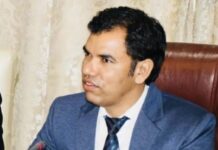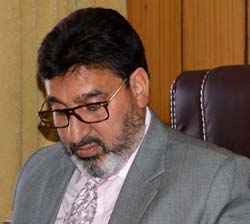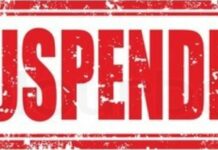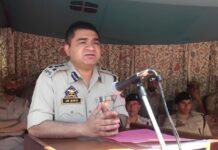Shah Abbas
SRINAGAR
Separatist camp is remembering its senior leader, Sheikh Abdul Aziz Monday on his sixth death anniversary. Aziz fell to the bullets while leading “Muzaffarabad Challo” rally on August 11, 2008 at Chehel in Uri.
A shutdown is being observed in Aziz’s home town of Pampore. Moreover, all the separatist organisations have issued statements paying tributes to late Hurriyat leader.
Pertinently, separatists had called for “Muzaffarabad Challo” against the ‘economical blockade’ of Kashmir valley by the Hindu extremists of Jammu.
Huge processions were taken out from various areas across the valley and Aziz along with Freedom Party chairman and Hurriyat (JK) chief Shabir Shah and Tehreek-e-Hurriyat leader Pir Saif-Ullah were leading the m
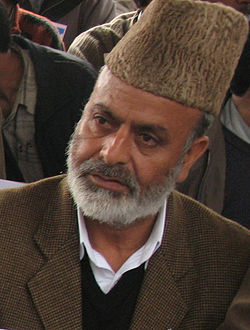
arch from Sopore towards the de-facto line.
“Muzaffarabad Cahllo” rally followed agitation against a government order issuing 400 Kanals of forest land to Shri Amarnath Shrine Board (SASB) at Baltal. The order was later revoked, but not before then Gh Nabi Azad government had to resign after Mufti led PDP withdrew support to PDP-congress Coalition. 2008 witnessed massive anti-India protests in the valley and according to data provided by the separatists 72 civilians were killed during these protests “by the hands of forces and police.”
“When our peaceful rally reached Chahal, 25 km away from Uri we were stopped by forces and police. At once, forces opened fire and Aziz along with many others were injured. All the critically injured were taken to Srinagar hospital, where Aziz died,” Pir Saif-Ullah told Kashmir Life. Aziz was later buried in Martyrs’ Graveyard in Eidgah, Srinagar on August 12, 2008 amidst strict curfew.
“That was a massive rally which saw bloodshed at the hands of forces right from Sopore,” Pir added. He said that dozens of people mostly youth got injured. Talking about Aziz’z death, Pir said, “He was a brave leader, he stood like a rock when bullets were showered on the rally from the front, I still remember his smile when he very simply showed us his blood after he was hit by bullet.”
Quoting Aziz Pir further said, “Sheikh informed us saying ‘Lagta Hay Mujay Goli Lagi Hay’. Adding, “He said this as if he was hit just by a stone.”
Aziz was chairman of the Jammu Kashmir Peoples League and a prominent member of the Hurriyat Conference faction led by peacenik Mirwaiz Umar Farooq. He was a strong advocate of Right to Self Determination and believed that an independent plebiscite in Kashmir under UN supervision could bring long lasting peace in South-Asia.
Aziz, a former militant commander, turned to politics after being released from long incarceration.
Aziz was born in 1952 in Namblabal area of Pampore town in the Southern peripheries of summer capital Srinagar famous for world class Saffron. According to his family sources, Aziz received basic education from Government School Pampore and then passed Matriculation from Government High School Pampore. Soon after passing his Matriculation examination, Aziz joined agriculture business of his father Sheikh Abdul Salam, including growing high yield Saffron.
Aziz along with Shabir Shah, Yasin Malik, Nayeem Ahmad Khan and Azam Inquilabi after veteran Hurriyat leader Syed Ali Geelani is believed to be among the pioneers of ongoing anti-India movement in Kashmir. Among these frontline separatists, only Aziz, Inquilabi and Malik took to arms.
Sheikh Abdul Aziz was in his early teens at the time of Moe-e-Muqqadus movement in Kashmir. Sources said that Aziz got emotionally attached with the separatist movement of Kashmir and started his political career as a student leader and worked with many student and youth organizations.
In 1972, when he was only 20 years, old Aziz had joined pro-freedom political group ‘Young Men’s League’ that called for Kashmir’s Right to Self Determination according to the UN Resolutions.
His political activities soon came under the scanner of police and he was then arrested for the first time and booked under National Security Act (NSA).
In 1973 the Young Men’s League and many other separatist groups merged and formed the Jammu and Kashmir People’s League to which Aziz remained associated with until his death.
According to People’s League sources, Aziz spent more than 16 years in prison. His longest spell of imprisonment came on May 21, 1993 when he was arrested and was released on September 27, 2000.




